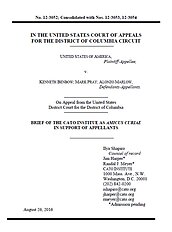Learn more about Cato’s Amicus Briefs Program.
When the D.C. district court ordered a seizure of Alonzo Marlow’s cell service location information (CSLI) held by his cell provider, it held that the federal government didn’t need a warrant to obtain CSLI data from a person’s phone provider. The Stored Communications Act of 1986 (SCA) governs the searching of such data, and under § 2703(d) of that act, federal investigators need not demonstrate probable cause in order to search—but merely to show “specific and articulable facts” that there is criminal wrongdoing. Thus, the Fourth Amendment requirement that “no warrants shall issue, but upon probable cause” is effectively removed. Cato has filed an amicus brief with the U.S. Court of Appeals for the D.C. Circuit, supporting the appeal of Marlow and his co-defendants. For purposes of the Fourth Amendment, cell phone data is a “paper” or “effect” in which there is a right of the people to be secure. The Supreme Court made clear in Riley v. California (2014) that giving police carte blanche to search a phone incident to an arrest would “in effect give police officers unbridled discretion to rummage at will among a person’s private effects.” Indeed, Marlow specifically protected his cell data from prying eyes through his user agreement; Sprint was contractually obligated to maintain his privacy unless some valid lawful process required production. As the government took Marlow’s data without his consent, there was a seizure of “effects” under the Fourth Amendment. But the district court did not issue a warrant for this seizure, instead simply acceding to the government’s § 2703(d) request. The government claims that the SCA created the lawful process that satisfies the contractual exemption, so Marlow is out of luck. But in order for that process to be valid, it needs to comport with the Fourth Amendment. When there is a property right to exclude others—which in this case was contractually created—the Fourth Amendment requires a probable-cause warrant, a higher standard than “specific and articulable facts.” Thus the SCA court order process itself is constitutionally infirm. The aim of the courts in interpreting the Fourth Amendment is to “assur[e] preservation of that degree of privacy against government that existed when the Fourth Amendment was adopted.” Kyllo v. United States(2001). But allowing the warrantless search of CSLI violates privacy as much as rummaging through a person’s physical papers did in 1776. To handle the challenges of the digital age, Fourth Amendment jurisprudence requires robust protection of cellular data contents as “effects.” We urge the D.C. Circuit to reverse the ruling below and make clear that property interests in data privacy are protected under the Fourth Amendment.



